
Enhancing Emergency Department Efficiency with Process Mining: Insights From Widener University's Study Using ABBYY Timeline

Enhancing Emergency Department Efficiency with Process Mining: Insights From Widener University’s Study Using ABBYY Timeline
Process Mining in Healthcare: Widener University Students Use ABBYY Timeline to Improve ED Patient Flow
Norma Najera
September 23, 2022
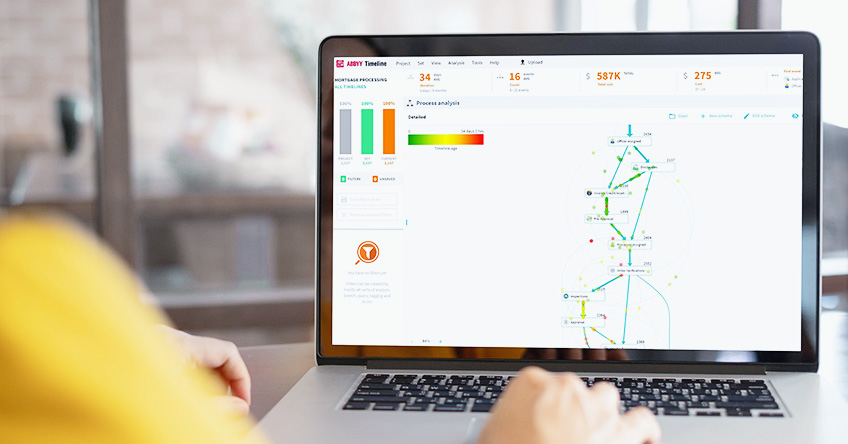
As an undergraduate student attending Widener University for my Bachelor’s in Business Analytics and Marketing, I couldn’t pass up the opportunity to go big for student project day. My mind was scattered as I struggled to decide what topic I wanted to choose related to my major. My colleague, Emily Pitcherello, recalled that our professor Ryan Raiker, senior director of process intelligence at ABBYY, had provided us with insight into his work by explaining the usefulness of ABBYY Timeline a couple of months prior.
Related article: What is process mining?
We, plus our third colleague Mary McFillin, began researching and interviewing both Mr. Raiker and one of Widener’s graduate assistants, Evan Davis. With sample data provided by Mr. Raiker and Mr. Davis’s navigation, we were able to focus our research on a couple of key components, including:
- efficiency and timeliness within an emergency room,
- the effects of these findings,
- and our recommendations for how they could improve.
To get us started, we were provided electronic health records of anonymous cases from a nearby 800-bed hospital. From here, we were able to convert it into an Excel data sheet. This data included everything from means of arrival to providers involved and even nurses. We were then able to upload it to ABBYY Timeline and examine the overall emergency room (ER) hospitalization process.
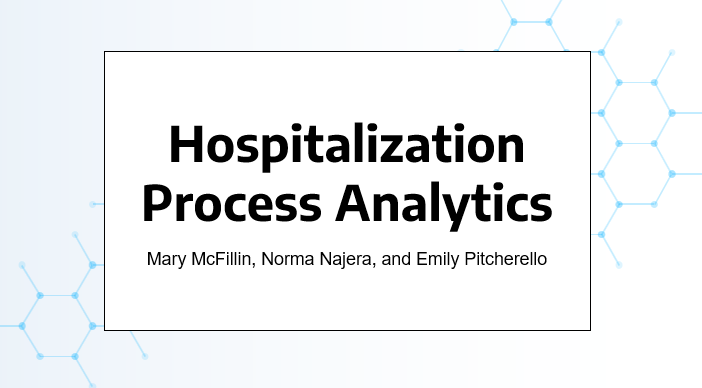
My specific role in our research was to analyze the data and its significance. In order to make comparisons and find significant results, I conducted some research outside of the data. According to the New York Times and the Washington Post , on average 50 percent of patients transferred to the hospital come in through the ER and the patients in the US wait roughly 40 minutes before being transferred to the proper department. During this time, healthcare workers typically work towards identifying the patient’s needs and symptoms. Once they are finished with that process, they take a little over two hours before patients are finally discharged. Ideally, the process should take no more than three hours.
ABBYY Timeline was able to demonstrate how, on average, the patients at this specific hospital waited around five hours in the ER. Since this is over seven times greater than the national average , we found it to be a concern and potential red flag.
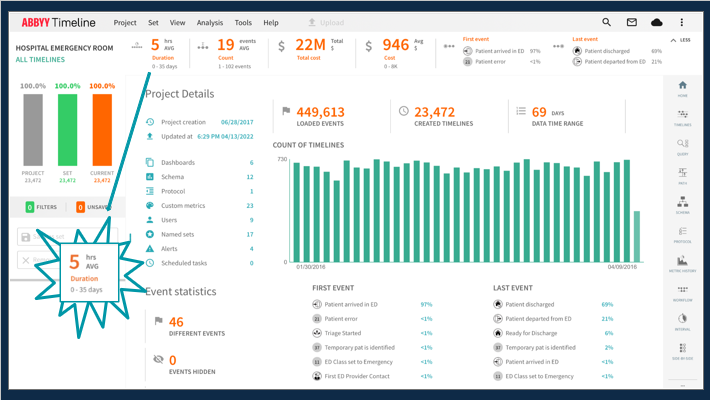
As a team of aspiring analysts, we were able to find potential improvements for the hospital such as QR codes on personal identification meant for healthcare workers, greater use of Apple’s iPhone features related to Medical ID, and the hiring of an experienced insurance verifier/coder.
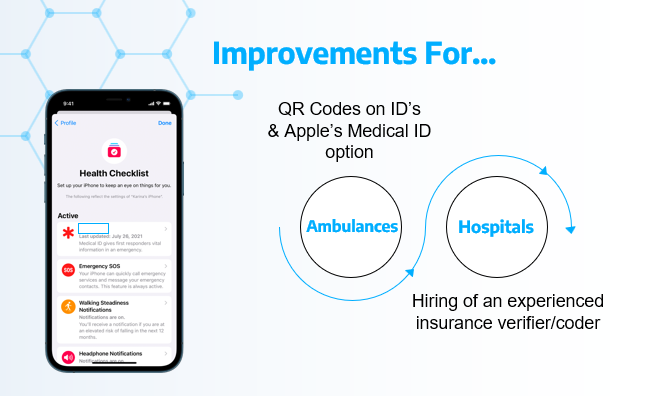
Through working with ABBYY Timeline, we were able to easily filter and navigate our data in order to find the results and issues we wanted to identify within this hospital. Furthermore, we were able to gain hands-on experience with process mining and its benefits to a company of any size.
As our world moves towards a heightened technology era, it’s crucial for the next generation of analysts, actuaries, economists, statisticians, etc. to gain experience and knowledge within process mining in order to keep an edge on the ever-shifting times.
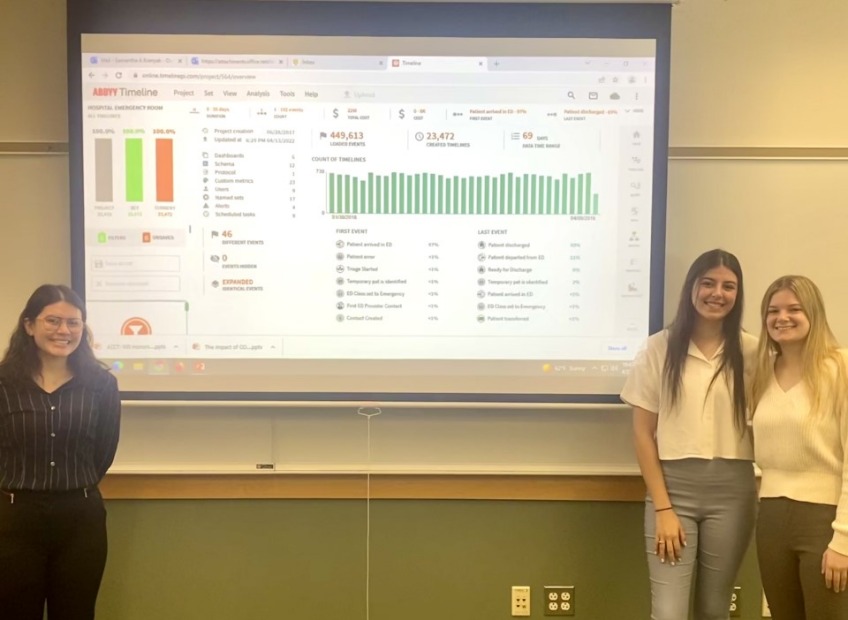
Curious to try a cloud-based, AI-driven process mining platform?

Norma Najera
Business Analytics BA, Marketing Minor, Widener University
Norma Najera is currently a 2nd-year student at Widener University, expecting to graduate with a major in Analytics and a minor in Marketing, with a concentration in Data Analysis. I’m interested in taking any steps to combine my knowledge of both data analysis and marketing in my prospective professional career.
Like, share or repost
Share
Subscribe for blog updates
First name*
E-mail*
Сountry*
СountryAfghanistanAland IslandsAlbaniaAlgeriaAmerican SamoaAndorraAngolaAnguillaAntarcticaAntigua and BarbudaArgentinaArmeniaArubaAustraliaAustriaAzerbaijanBahamasBahrainBangladeshBarbadosBelgiumBelizeBeninBermudaBhutanBoliviaBonaire, Sint Eustatius and SabaBosnia and HerzegovinaBotswanaBouvet IslandBrazilBritish Indian Ocean TerritoryBritish Virgin IslandsBrunei DarussalamBulgariaBurkina FasoBurundiCambodiaCameroonCanadaCape VerdeCayman IslandsCentral African RepublicChadChileChinaChristmas IslandCocos (Keeling) IslandsColombiaComorosCongo (Brazzaville)Congo, (Kinshasa)Cook IslandsCosta RicaCroatiaCuraçaoCyprusCzech RepublicCôte d’IvoireDenmarkDjiboutiDominicaDominican RepublicEcuadorEgyptEl SalvadorEquatorial GuineaEritreaEstoniaEthiopiaFalkland Islands (Malvinas)Faroe IslandsFijiFinlandFranceFrench GuianaFrench PolynesiaFrench Southern TerritoriesGabonGambiaGeorgiaGermanyGhanaGibraltarGreeceGreenlandGrenadaGuadeloupeGuamGuatemalaGuernseyGuineaGuinea-BissauGuyanaHaitiHeard and Mcdonald IslandsHoly See (Vatican City State)HondurasHong Kong, SAR ChinaHungaryIcelandIndiaIndonesiaIraqIrelandIsle of ManIsraelITJamaicaJapanJerseyJordanKazakhstanKenyaKiribatiKorea (South)KuwaitKyrgyzstanLao PDRLatviaLebanonLesothoLiberiaLibyaLiechtensteinLithuaniaLuxembourgMacao, SAR ChinaMacedonia, Republic ofMadagascarMalawiMalaysiaMaldivesMaliMaltaMarshall IslandsMartiniqueMauritaniaMauritiusMayotteMexicoMicronesia, Federated States ofMoldovaMonacoMongoliaMontenegroMontserratMoroccoMozambiqueMyanmarNamibiaNauruNepalNetherlandsNetherlands AntillesNew CaledoniaNew ZealandNicaraguaNigerNigeriaNiueNorfolk IslandNorthern Mariana IslandsNorwayOmanPakistanPalauPalestinian TerritoryPanamaPapua New GuineaParaguayPeruPhilippinesPitcairnPolandPortugalPuerto RicoQatarRomaniaRwandaRéunionSaint HelenaSaint Kitts and NevisSaint LuciaSaint Pierre and MiquelonSaint Vincent and GrenadinesSaint-BarthélemySaint-Martin (French part)SamoaSan MarinoSao Tome and PrincipeSaudi ArabiaSenegalSerbiaSeychellesSierra LeoneSingaporeSint Maarten (Dutch part)SlovakiaSloveniaSolomon IslandsSouth AfricaSouth Georgia and the South Sandwich IslandsSouth SudanSpainSri LankaSurinameSvalbard and Jan Mayen IslandsSwazilandSwedenSwitzerlandTaiwan, Republic of ChinaTajikistanTanzania, United Republic ofThailandTimor-LesteTogoTokelauTongaTrinidad and TobagoTunisiaTurkeyTurks and Caicos IslandsTuvaluUgandaUkraineUnited Arab EmiratesUnited KingdomUnited States of AmericaUruguayUS Minor Outlying IslandsUzbekistanVanuatuVenezuela (Bolivarian Republic)Viet NamVirgin Islands, USWallis and Futuna IslandsWestern SaharaZambiaZimbabwe
I have read and agree with the Privacy policy and the Cookie policy .
I agree to receive email updates from ABBYY Solutions Ltd. such as news related to ABBYY Solutions Ltd. products and technologies, invitations to events and webinars, and information about whitepapers and content related to ABBYY Solutions Ltd. products and services.
I am aware that my consent could be revoked at any time by clicking the unsubscribe link inside any email received from ABBYY Solutions Ltd. or via ABBYY Data Subject Access Rights Form .
Referrer
Last name
Query string
Product Interest Temp
UTM Campaign Name
UTM Medium
UTM Source
ITM Source
GA Client ID
UTM Content
GDPR Consent Note
Captcha Score
Page URL
Connect with us
Also read:
- Affordable Amazon Kindle of 2019 - Your Must-Have Guide to the Basic E-Book Reader!
- Complete Set of Drivers for Your HP Deskjet 3520: Direct Download Page
- Download Your Own Portable Version: Freeze Frame Edition - On-the-Move Viewing
- Effortless Conversion of VOB Video Files to AVI for Windows Users
- Effortless Format Transformation: Convert 3GP Videos to Popular File Types (MP4, AVI, MKV) with Our Advanced Converter
- Guide: Two Hassle-Free Ways to Insert Watermarks Into YouTube Content
- How to Reset Gmail Password on Tecno Spark 20 Pro+ Devices
- In 2024, 3 Ways to Fake GPS Without Root On Xiaomi Redmi Note 12 Pro+ 5G | Dr.fone
- Unveiling the Ultimate Collection of Wireless Charger Picks for 2E24: Professional Evaluation | ZDNET
- Title: Enhancing Emergency Department Efficiency with Process Mining: Insights From Widener University's Study Using ABBYY Timeline
- Author: Ronald
- Created at : 2024-10-07 21:26:16
- Updated at : 2024-10-14 22:48:26
- Link: https://solve-info.techidaily.com/enhancing-emergency-department-efficiency-with-process-mining-insights-from-widener-universitys-study-using-abbyy-timeline/
- License: This work is licensed under CC BY-NC-SA 4.0.